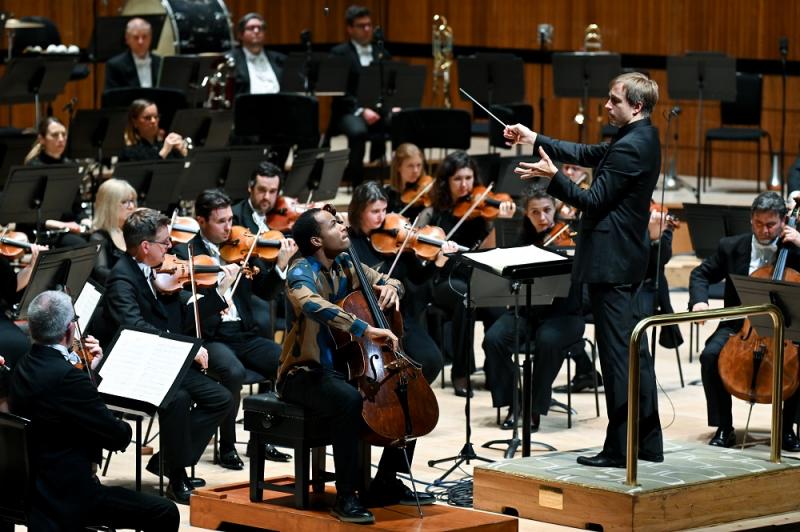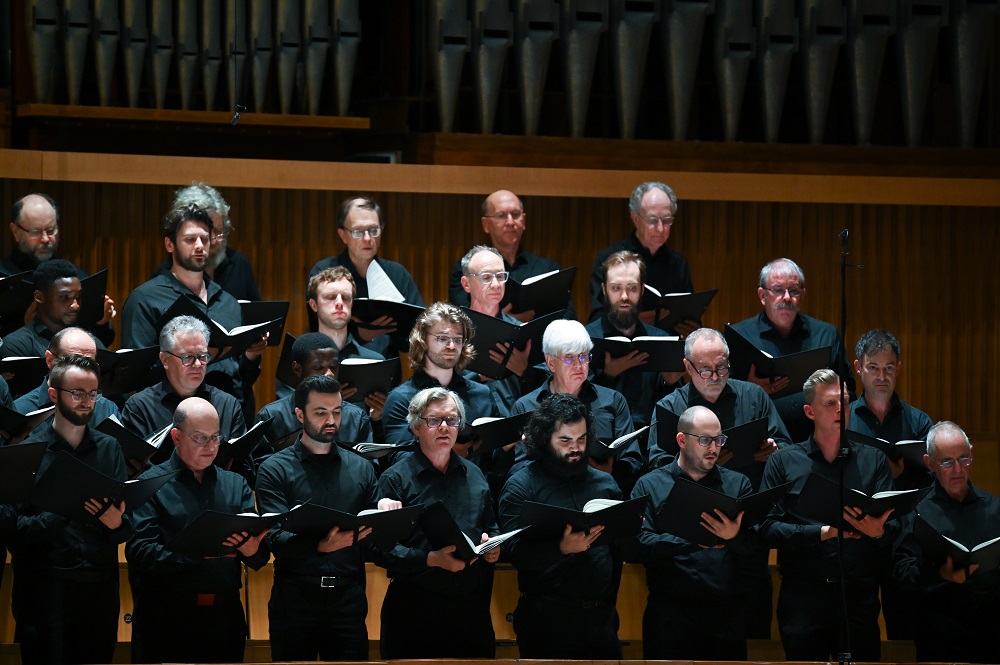Sheku Kanneh-Mason, Philharmonia Chorus, RPO, Petrenko, RFH review - poetic cello, blazing chorus | reviews, news & interviews
Sheku Kanneh-Mason, Philharmonia Chorus, RPO, Petrenko, RFH review - poetic cello, blazing chorus
Sheku Kanneh-Mason, Philharmonia Chorus, RPO, Petrenko, RFH review - poetic cello, blazing chorus
Atmospheric Elgar and Weinberg, but Rachmaninov's 'The Bells' takes the palm

Purple patches flourished in the first half of this admirable programme: it could hardly have been otherwise given Sheku Kanneh-Mason’s devotion to a new work in his repertoire, and the current strength of the Royal Philharmonic Orchestra under Vasily Petrenko. Even so, it was the culmination, Rachmaninov’s multifaceted “Choral Symphony” The Bells, which truly dazzled.
It seems so obvious: Petrenko just knows this idiom and is completely at ease with the difficult Rachmaninov rubato. The Philharmonia Chorus was simply electrifying: hard to believe they weren’t professionals with a knockout sound like that.
This, rather than the too church-choiry Tenebrae, is what Pappano needed for his Ravel Daphnis et Chloé, repeated last night over at the Barbican at around the same time. The two masterpieces are only a year apart, and Rachmaninov proves master orchestrator too in the glitttering spirit of delight that frames his opening sleigh-ride. What a punch from the opening choral response to the tenor’s “listen!”, though, and what overwhelming climaxes throughout (pictured below: the men of the Philharmonia Chorus).  It takes real power and expression to hold focus in the “Loud Alarm Bells” movement; in Konstantin Balmont’s translation of Edgar Allan Poe, when the voices become the flames in “I want to go higher, to burn higher, to touch the moonbeams”, the effect was one of terrifying levitation. Special kudos to Chorus Master Gavin Carr,
It takes real power and expression to hold focus in the “Loud Alarm Bells” movement; in Konstantin Balmont’s translation of Edgar Allan Poe, when the voices become the flames in “I want to go higher, to burn higher, to touch the moonbeams”, the effect was one of terrifying levitation. Special kudos to Chorus Master Gavin Carr,
It was satisfying but not tokenistic that the three soloists came from countries or peoples persecuted by Russia (let’s not forget, either, that Rachmaninov was forced into exile). Belarusian tenor Pavel Petrov captured the right bright sweetness about the first movement; Estonian Mirjam Mesak blossomed in the upper reaches for the almost Tristanesque union of “The Mellow Wedding Bells”; and Ukrainian Andrii Kymach, 2019 BBC Cardiff Singer of the World, provided bass-baritonal anchoring and a painfully expressive core to “The Mournful Iron Bells”. Petrenko brought an instant a change of colour to the mellow major in Rachmaninov’s almost Mahlerian final transcendence. (Kymach, Mesak and Petrov pictured below with Petrenko and the RPO).  The RPO, cutting brass especially, had maximum impact here. It might have had even more for Elgar’s In the South (Alassio), a teeming panorama of the composer’s Italian impressions indebted at times to Strauss’s Don Juan, had Petrenko kept the momentum. As with his performance of the Cockaigne Overture earlier this season, the lyrical passages were too over-loved, though that didn’t stop principal viola Abigail Fenna making the lullaby after all that ancient Roman hurly-burly supremely and simply affecting.
The RPO, cutting brass especially, had maximum impact here. It might have had even more for Elgar’s In the South (Alassio), a teeming panorama of the composer’s Italian impressions indebted at times to Strauss’s Don Juan, had Petrenko kept the momentum. As with his performance of the Cockaigne Overture earlier this season, the lyrical passages were too over-loved, though that didn’t stop principal viola Abigail Fenna making the lullaby after all that ancient Roman hurly-burly supremely and simply affecting.
Many in the lively but rather cough-afflicted audience had come to hear Sheku Kanneh-Mason, and as always they won’t have been disappointed. He’s not resting on his laurels, and needed no reference to the score in his masterly overview of Weinberg’s Cello Concerto. Composed in 1948 in the wake of Stalin’s second big crack-down, via his right-hand man Andrey Zhdanov, on musical freedom of expression, it needn’t have waited in the wings until 1956: everything is direct, clear, more or less untainted by the influence of Shostakovich. I don’t hear the Jewish idiom suggested in the middle movements; the second seems to be a habanera where at last the brass get to strut their stuff, the third hardly demonic or tortured, though not without a dash of the grotesque.
Kanneh-Mason took us straight to the heart of the opening Adagio, which also closes the work: poignant stuff, if not quite as memorable as the main idea, which operates similarly, in the slightly later Fantasia for cello and orchestra. That’s first class; this is perhaps a second-rank work - which is not the same as second-rate – but it could not have had a more sensitive response. Good, too, that the cellist didn’t go for encore flash; Weinberg’s similarly reflective and perhaps more personal Eighteenth Prelude was the perfect rejoinder.
rating
Share this article
The future of Arts Journalism
You can stop theartsdesk.com closing!
We urgently need financing to survive. Our fundraising drive has thus far raised £49,000 but we need to reach £100,000 or we will be forced to close. Please contribute here: https://gofund.me/c3f6033d
And if you can forward this information to anyone who might assist, we’d be grateful.

Subscribe to theartsdesk.com
Thank you for continuing to read our work on theartsdesk.com. For unlimited access to every article in its entirety, including our archive of more than 15,000 pieces, we're asking for £5 per month or £40 per year. We feel it's a very good deal, and hope you do too.
To take a subscription now simply click here.
And if you're looking for that extra gift for a friend or family member, why not treat them to a theartsdesk.com gift subscription?
more Classical music
 Aldeburgh Festival Weekend 1 review - dance to the music of time
From Chekhovian opera to supernatural ballads, past passions return to life by the sea
Aldeburgh Festival Weekend 1 review - dance to the music of time
From Chekhovian opera to supernatural ballads, past passions return to life by the sea
 Dandy, BBC Philharmonic, Storgårds, Bridgewater Hall, Manchester review - a destination attained
A powerful experience endorses Storgårds’ continued relationship with the orchestra
Dandy, BBC Philharmonic, Storgårds, Bridgewater Hall, Manchester review - a destination attained
A powerful experience endorses Storgårds’ continued relationship with the orchestra
 Hespèrion XXI, Savall, QEH review - an evening filled with laughter and light
An exhilarating exploration of innovation in 16th and 17th century repertoire
Hespèrion XXI, Savall, QEH review - an evening filled with laughter and light
An exhilarating exploration of innovation in 16th and 17th century repertoire
 theartsdesk at the Dublin International Chamber Music Festival - musical revelations, nature beyond
Artistic director Ciara Higgins’ programming ensures plenty of surprises
theartsdesk at the Dublin International Chamber Music Festival - musical revelations, nature beyond
Artistic director Ciara Higgins’ programming ensures plenty of surprises
 Müller-Schott, RSNO, Søndergård, Usher Hall, Edinburgh - spectacular Shostakovich to end the season
Brilliant orchestral results, while the cellist walks a tightrope in the Second Cello Concerto
Müller-Schott, RSNO, Søndergård, Usher Hall, Edinburgh - spectacular Shostakovich to end the season
Brilliant orchestral results, while the cellist walks a tightrope in the Second Cello Concerto
 Classical CDs: Cannons, culverts and mooching cattle
Box sets celebrating a pair of conductors, plus baroque vocal music and a beguiling bassoon anthology
Classical CDs: Cannons, culverts and mooching cattle
Box sets celebrating a pair of conductors, plus baroque vocal music and a beguiling bassoon anthology
 Marwood, Crabb, Wigmore Hall review - tangos, laments and an ascending lark
Accordion virtuoso’s brilliant arrangements showcase the possibilities of the instrument
Marwood, Crabb, Wigmore Hall review - tangos, laments and an ascending lark
Accordion virtuoso’s brilliant arrangements showcase the possibilities of the instrument
 Batiashvili, LSO, Pappano, Barbican review - French and Polish narcotics
Szymanowski’s fantasy more vague than Berlioz’s, but both light up the hall
Batiashvili, LSO, Pappano, Barbican review - French and Polish narcotics
Szymanowski’s fantasy more vague than Berlioz’s, but both light up the hall
 Owen, Manchester Camerata, Takács-Nagy, Stoller Hall, Manchester review - more Mozart made in Manchester
Another breath of fresh air in the chamber orchestra’s approach to the classics
Owen, Manchester Camerata, Takács-Nagy, Stoller Hall, Manchester review - more Mozart made in Manchester
Another breath of fresh air in the chamber orchestra’s approach to the classics
 Josefowicz, LSO, Mälkki, Barbican review - two old favourites and one new one
Julia Perry well worth her place alongside Stravinsky and Bartók
Josefowicz, LSO, Mälkki, Barbican review - two old favourites and one new one
Julia Perry well worth her place alongside Stravinsky and Bartók
 Classical CDs: Jelly Babies, porridge and kazoos
German art songs, French piano concertos and entertaining contemporary music
Classical CDs: Jelly Babies, porridge and kazoos
German art songs, French piano concertos and entertaining contemporary music

Add comment